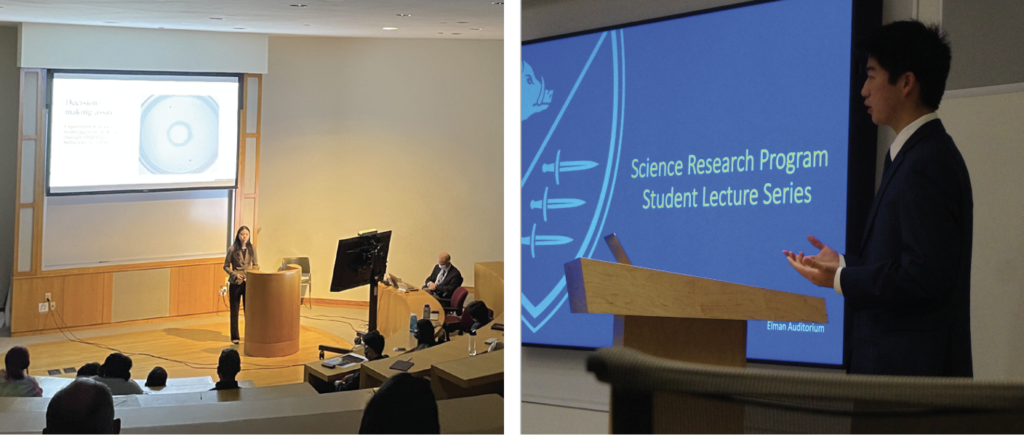
On Tuesday, November 9, and Thursday, November 11, the 14 sixth-form participants of the Science Research Program (SRP) gave their annual Student Lecture Series (SLS) presentationsdetailing their summer research. Each night from 7 to 8:30 p.m., two sessions were held simultaneously in Elman and Getz Auditorium. Each presentation was around twelve minutes long followed by a brief Q&A session. Though the presentations were only open to members of the Choate community due to health and safety concerns, the event was live streamed over Zoom for guests to attend remotely.
As Choate’s oldest Signature Program, SRP is a rigorous, four-term program designed to give students the opportunity to experience the life of a professional research scientist. The program is split into two sections: the Quantitative Sciences cohort, led by science teacher Dr. Chris Hogue, and Biological Sciences cohort, led by science teacher Dr. Selena Gell.
During their fifth-form year, students in SRP learned how to dissect scientific literature, design and conduct experiments, and write scientific reports. In addition to their homework, students read papers by principal investigators (PIs) and reached out to them with requests for summer research opportunities. As soon as they secured a lab internship, students conducted extensive background research in their respective field, culminating in a review paper at the end of the spring term.
Over the summer, the students worked for a minimum of eight weeks in college laboratories conducting their research projects. Throughout their time working in the lab, students kept a research log to track their progress.
Throughout this term, students have created professional research posters for display in the Science Center, written journal articles detailing their research, and prepared to present their work to the community in the SLS. These talks, however, are not ordinary class presentations but polished and professional talks that have been perfected over the duration of the program.
According to Dr. Hogue, the process is arduous yet fulfilling. “[Students] start with storyboarding, developing the overall story arc of their talk. They develop analogies and simplify both the science and technical jargon so the talk is accessible to a wider audience. They create and refine graphics and animations and work to create strong transitions to keep the audience engaged. At every stage along the way, they gather feedback from their SRP teacher and classmates and make changes, large and small.”
Joy Bang ’22, a member of the Biological Sciences cohort, conducted research on common genetic and pathway profiles within the fibroblasts of aging lungs, lung cancer, and lung fibrosis. Reflecting on her SLS presentation, she considered simplifying the complexity of her research as the greatest challenge. “I was really struggling to find the right intersection between the advanced research that I did over the summer and trying to explain it to the lay audience, who we assumed would have only the most basic scientific knowledge,” she said.
Dan Xiao ’22, a member of the Quantitative Sciences cohort, conducted research in finding genes and transition factors that prevent axon regeneration after trauma. He echoed Bang’s sentiment on the stressful preparation process, saying, “My presentation has been through many iterations, so it was very stressful making those changes and memorizing them.” He added, “It was challenging to know what to cut from my presentation without losing too much of the meaning or science behind my research.”
Reflecting on their time in the program, Bang and Xiao shared their love for their respective cohorts and expressed that they were sentimental to watch their SRP experience come to an end. Bang said, “I love that SRP provided me with a unique opportunity to pursue my passions in scientific research. I also love the bonds that I was able to form with my SRP Bio cohort. Although we started this long journey as complete strangers, we became such a close group of friends.” She added, “Because they were the only ones in the School that understood exactly what I was going through, I was able to rely on them for support, and they also gave critical feedback in the process of crafting my presentation.”




